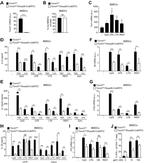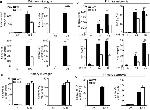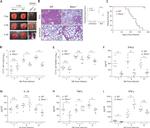Search Thermo Fisher Scientific
Invitrogen
TNF alpha Polyclonal Antibody, Biotin, eBioscience™
This Antibody was verified by Cell treatment to ensure that the antibody binds to the antigen stated.
FIGURE: 1 / 6
TNF alpha Antibody (13-7341-81) in ELISA






Product Details
13-7341-81
Species Reactivity
Published species
Host/Isotype
Class
Type
Conjugate
Form
Concentration
Purification
Storage buffer
Contains
Storage conditions
Shipping conditions
RRID
Product Specific Information
Description: The affinity purified polyclonal rabbit antibody reacts with mouse and rat tumor necrosis factor-alpha. Mouse TNF alpha is a 17 kDa factor produced by macrophages, monocytes, neutrophils, CD4 T cells, and NK cells. A 26 kDa form is expressed as a membrane-bound molecule. TNF alpha is cytolytic and plays an important role in immune regulation. Bioactive TNF alpha exists as a homotrimer.
Applications Reported: This polyclonal antibody has been reported for use in ELISA and ELISPOT.
Applications Tested: The biotinylated rabbit anti-mouse/rat TNF alpha polyclonal antibody has been tested as the detection antibody in a sandwich ELISA for analysis of mouse or rat TNF alpha in combination with the purified anti-mouse/rat TNF alpha monoclonal antibody, clone TN3.19 (14-7423) for capture and recombinant mouse TNF alpha (14-8321) or rat TNF alpha (14-8321) as the standard. A suitable range of concentrations of this biotinylated antibody for ELISA detection is 0.5 - 2 µg/mL. A standard curve consisting of doubling dilutions of the recombinant standard over the range of 2000 pg/mL - 15 pg/mL (mouse TNF alpha) or 5000 - 30 pg/mL (rat TNF alpha) should be included in each ELISA plate. Recognition of mouse TNF alpha by this assay is not interfered with by 1000x excess soluble TNF alpha receptor type I or II.
Filtration: 0.2 µm post-manufacturing filtered.
Target Information
TNF alpha is a multifunctional proinflammatory cytokine that belongs to the tumor necrosis factor (TNF) superfamily. This cytokine is mainly secreted by macrophage and bind to its receptors, TNFRSF1A/TNFR1 and TNFRSF1B/TNFBR. TNF alpha is involved in the regulation of immune cells, cell proliferation, differentiation, apoptosis, lipid metabolism, and coagulation. TNF alpha exists as a multimer of two, three, or five noncovalently linked units, but shows a single 17 kDa band following SDS-PAGE under non-reducing conditions. Knockout studies in mice also suggested the neuroprotective function of TNF alpha, and has been observed to causes tumor necrosis when injected into tumor-bearing mice. Other functions of TNF-alpha include its role in the immune response to bacterial, viral, parasitic and certain fungal infections, as well as its role in the necrosis of specific tumors. TNF alpha causes cytolysis or cytostasis of certain transformed cells, being synergistic with interferon-gamma in its cytotoxicity. This cytokine has been implicated in a variety of diseases, including autoimmune diseases, insulin resistance, and cancer.
For Research Use Only. Not for use in diagnostic procedures. Not for resale without express authorization.
Bioinformatics
Protein Aliases: Cachectin; DADB-70P7.1; TNF alpha; TNF superfamily; TNF α; TNF-a; TNF-alpha; TNFα; Tumor necrosis factor; tumor necrosis factor (TNF superfamily, member 2); tumor necrosis factor alpha; Tumor necrosis factor ligand superfamily member 2; tumor necrosis factor-alpha
Gene Aliases: DIF; RATTNF; Tnf; TNF-a; TNF-alpha; Tnfa; TNFalpha; Tnfsf1a; TNFSF2
UniProt ID: (Rat) P16599, (Mouse) P06804
Entrez Gene ID: (Rat) 24835, (Mouse) 21926

Performance Guarantee
If an Invitrogen™ antibody doesn't perform as described on our website or datasheet,we'll replace the product at no cost to you, or provide you with a credit for a future purchase.*
Learn more
We're here to help
Get expert recommendations for common problems or connect directly with an on staff expert for technical assistance related to applications, equipment and general product use.
Contact tech support
